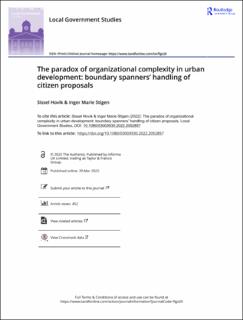The paradox of organizational complexity in urban development: boundary spanners’ handling of citizen proposals
Peer reviewed, Journal article
Published version
Permanent lenke
https://hdl.handle.net/11250/3024549Utgivelsesdato
2022-03-20Metadata
Vis full innførselSamlinger
- Publikasjoner fra Cristin [3269]
- SAM - Handelshøyskolen [392]
Originalversjon
https://doi.org/10.1080/03003930.2022.2052857Sammendrag
Although local governments establish various arrangements to stimulate citizen participation, knowledge about what happens with citizens’ proposals after participation is weak. To gain impact, citizen initiatives must be handled through the decision-making process. This article examines the dynamics of such handling of input from citizen participation in three different cases linked to an area-based initiative in Oslo, Norway. The study shows that different actors can play a role as boundary spanners handling citizen proposals, and how this crucial handling varies with the structural and procedural linkages between the participatory spaces and the formal decision-making processes. The study reveals a ‘complexity paradox’; in cases where responsibility is shared among different sectors and levels of government, each unit represents a veto point that can hinder citizen impact, but also an entrance that can enable such impact.

